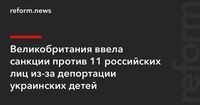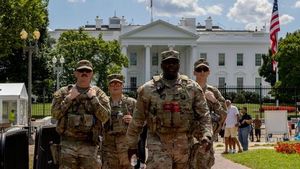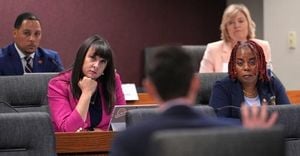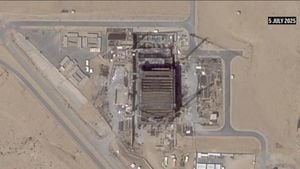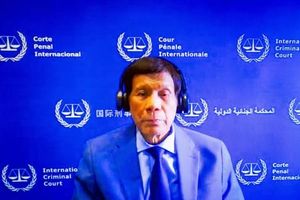On September 3, 2025, the United Kingdom took a decisive step against what it describes as the systematic deportation and militarization of Ukrainian children by Russian authorities. In a move that underscores ongoing tensions between London and Moscow, the UK government unveiled a new package of sanctions targeting individuals and organizations allegedly complicit in the forced removal and ideological reprogramming of thousands of Ukrainian minors. The announcement, made public by the UK Foreign, Commonwealth & Development Office, marks one of the most pointed responses yet from Britain to Russia’s actions in Ukraine since the full-scale invasion began more than three years ago.
According to official statements cited by multiple outlets, including BBC and Kommersant, the sanctions list features eleven individuals and three organizations. Among the most prominent are the Akhmat Kadyrov Foundation—a group closely linked to the Chechen leadership—and its president, Aiman Kadyrova, who is also the mother of Chechen leader Ramzan Kadyrov. The UK government alleges that the foundation has been at the forefront of so-called “re-education” programs, which combine ideological indoctrination with military-style training for Ukrainian children and teenagers forcibly transferred from occupied territories.
The UK’s move comes amid mounting evidence, documented by Western intelligence and human rights groups, that more than 19,500 Ukrainian children have been forcibly taken to Russia or Russian-occupied parts of Ukraine since the conflict escalated in February 2022. Of these, British officials estimate that approximately 6,000 have been funneled into a network of camps and institutions dedicated to erasing their Ukrainian identity and instilling pro-Russian sentiments. The British government’s press release, as reported by Radio Komsolmolskaya Pravda, bluntly described these efforts as a “criminal policy” and a “systematic campaign to destroy Ukrainian language, culture, and identity.”
Foreign Secretary David Lammy did not mince words in his condemnation. “The Kremlin’s policy of deporting and militarizing children demonstrates the depth of depravity to which Putin is prepared to go to wipe out Ukrainian language, culture, and identity. No child should ever be a pawn of war,” Lammy declared, according to the official government statement. His remarks echo growing international outrage over Russia’s handling of Ukrainian minors in territories it controls.
The sanctions package, as detailed by the UK government, is not limited to the Kadyrov Foundation and its leadership. Other entities now facing restrictions include the “Center for Adolescent Programs,” headed by Valery Mayorov, which the UK alleges has played a key role in fostering pro-Russian attitudes among children from occupied regions. Additional organizations such as “Volunteers of Victory” and “Movement of the First”—the latter described as reviving Soviet-style youth traditions—were also named. The list of sanctioned individuals extends to officials like Natalia Tishchenko, co-chair of the “People’s Front” in occupied Kherson; Zamid Chalaev, commander of Chechen police special forces; Leyla Fazleeva, Deputy Prime Minister of Tatarstan; Rinat Sadykov, Tatarstan’s Minister of Education and Science; and Alexander Gurov. Anastasia Akkuratova, Deputy Director of the Department of State Policy for the Protection of Children’s Rights at Russia’s Ministry of Education, was also included.
These latest measures build on previous British sanctions from November 2024, which targeted Russian officials and entities involved in the forced transfer of Ukrainian children, including leaders of youth organizations and administrators of children’s institutions in occupied Kherson. The UK’s new actions signal a continued and escalating effort to hold accountable those it sees as responsible for what it calls “war crimes” against Ukrainian youth.
The British government’s statement, as reported by BBC, emphasized the magnitude of the problem: “More than 19,500 Ukrainian children have been forcibly taken out or deported to Russia or occupied territories of Ukraine. Approximately 6,000 of these children have been registered in the registry of forced deportation. There, they are subjected to ideological processing aimed at destroying their Ukrainian identity and forming pro-Russian sentiments.”
Officials in London argue that these practices are not new, but rather the continuation of a strategy that began with Russia’s annexation of Crimea over a decade ago. “This strategy dates back to the illegal annexation of Crimea by Russia more than 10 years ago,” the UK government noted in its statement. The recent sanctions, therefore, are presented as part of a broader effort to push back against long-standing attempts to assimilate Ukrainian children into Russian society—by force if necessary.
While the UK’s sanctions are largely symbolic in their immediate effect—freezing assets and imposing travel bans on those named—they carry significant diplomatic weight. The hope, British officials say, is to increase international pressure on Moscow and deter further abuses. The Foreign, Commonwealth & Development Office, working in tandem with the Center for Sanctions Programs, made clear that these measures are designed to “hold accountable all those responsible for the criminal policy of deporting and militarizing children.”
Notably, the UK’s move has drawn support from several Western allies, who see the protection of children as a red line in the ongoing conflict. Human rights advocates have long warned that the forced removal and indoctrination of children constitute violations of international law, including the Geneva Conventions. The UK’s actions, then, are as much about upholding global norms as they are about punishing specific actors.
Yet, the Russian government has consistently denied any wrongdoing, insisting that its programs are aimed at protecting children from the dangers of war and providing them with better opportunities. Russian officials have accused the West of politicizing humanitarian efforts and have dismissed the sanctions as “unjustified interference.” The Kremlin’s narrative, however, has found little resonance outside its own borders, particularly as mounting evidence of forced deportations and re-education efforts continues to emerge.
As the conflict grinds on, the fate of thousands of Ukrainian children remains uncertain. The UK’s latest sanctions package is unlikely to bring an immediate end to the deportations, but it does send a clear signal: London, at least, is determined to keep the spotlight on what it sees as one of the war’s most egregious abuses. And as Foreign Secretary Lammy put it, “No child should ever be a pawn of war.”
The coming months will reveal whether these measures have any tangible impact—or whether they are simply the latest salvo in a long and bitter standoff between Russia and the West over the future of Ukraine’s youngest and most vulnerable citizens.
